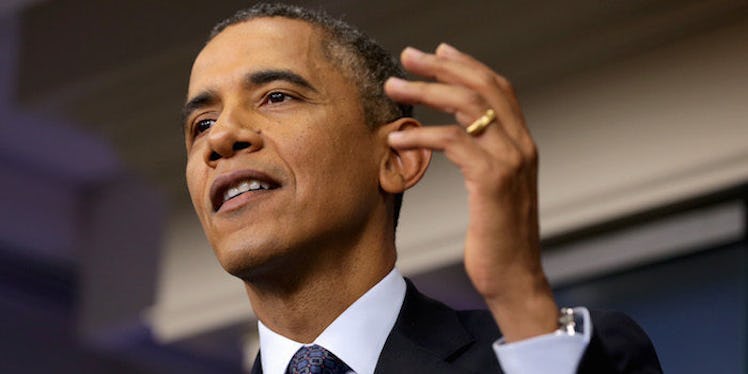
The Bill Of Student's Rights Shows Obama's Legacy For Sparking Change
On March 10, Barack Obama signed the "Student Aid Bill of Rights," which requires several government agencies to help college students pay back their loans.
He said:
Higher education has never been more important, but it's also never been more expensive. We're going to make sure that loan servicers can find better ways to help borrowers keep up with monthly payments that they can afford.
The law comes in the wake of Obama's free community college proposal that he unsheathed at the last State of the Union.
The plan would have leveled the playing field for students who don't have the money to afford a four-year education and don't want to take on the massive loans it requires to pay for one.
But, as has happened throughout his presidency, Congress didn't play ball. So, Obama started working on the solution without them.
The student bill of rights may lack the teeth of a Congress-approved law, but as he has done throughout his presidency, Obama got the ball rolling.
For healthcare, Obama wanted the public option that would allow the government to offer insurance, much like the renowned systems in Europe and Canada.
But, Republicans blocked that, so he settled for the online marketplace, where prospective clients can choose from subsidized private options.
He eliminated the right of healthcare companies to deny insurance based on a preexisting condition and made enrollment a far easier, and less expensive process.
In the past two years, nearly 20 million people have received health insurance through this system.
Impressive, considering Congress has tried to repeal it dozens and dozens of times.
For global warming, Obama has fought against representatives like Jim Inhofe (R-OK). Inhofe wrote a book denying global warming, claimed the Bible refutes climate change and threw a snowball in the middle of Congress to "disprove" the overwhelming scientific consensus on the issue.
Jim Inhofe is also the chairman of the Senate Environment Committee.
To repeat, Jim Inhofe, a man who receives most of his campaign money from energy companies, was put in charge of caring for the environment.
If this were a sci-fi movie, we would laugh at the unrealistic plot.
In spite of this lunacy, Obama has officially recognized global warming, ordered conservation and vetoed the recent Keystone Pipeline bill. Against an absurd opposition, the president has still done planet-saving work.
Finally, in the face of a racist criminal justice system, Obama has taken a measured approach, siding both with slain police officers and murdered civilians.
He has fostered a dialogue not of conflict, but of cooperation. In a political climate with two sharply divided sides, both begging him to support them, the president has chosen the path most likely to generate real change.
On an issue that could fracture our nation, he has admirably represented every American citizen in the long struggle to resolve our mass incarceration problem.
In his time in office, President Obama has publicly supported gay marriage, allowed states to legalize marijuana and taken more precise action in the Middle East that accomplished the long sought goal of killing Osama bin Laden.
When Obama first got elected, the nation swooned. We thought this charismatic newcomer was going to fix the way Washington worked. But, he struggled to follow through on all his promises because of Congress' historic gridlock.
Still, even in this insane political atmosphere, the president has made meaningful progress on the most important modern issues, planting seeds that will hopefully grow into the America we imagined in 2008.
Obama couldn't fix our country, but at least he pushed us in the right direction.